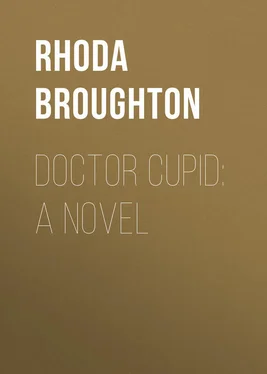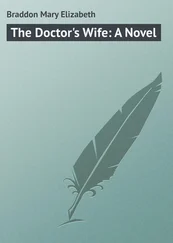Rhoda Broughton - Doctor Cupid - A Novel
Здесь есть возможность читать онлайн «Rhoda Broughton - Doctor Cupid - A Novel» — ознакомительный отрывок электронной книги совершенно бесплатно, а после прочтения отрывка купить полную версию. В некоторых случаях можно слушать аудио, скачать через торрент в формате fb2 и присутствует краткое содержание. Жанр: foreign_antique, foreign_prose, на английском языке. Описание произведения, (предисловие) а так же отзывы посетителей доступны на портале библиотеки ЛибКат.
- Название:Doctor Cupid: A Novel
- Автор:
- Жанр:
- Год:неизвестен
- ISBN:нет данных
- Рейтинг книги:4 / 5. Голосов: 1
-
Избранное:Добавить в избранное
- Отзывы:
-
Ваша оценка:
- 80
- 1
- 2
- 3
- 4
- 5
Doctor Cupid: A Novel: краткое содержание, описание и аннотация
Предлагаем к чтению аннотацию, описание, краткое содержание или предисловие (зависит от того, что написал сам автор книги «Doctor Cupid: A Novel»). Если вы не нашли необходимую информацию о книге — напишите в комментариях, мы постараемся отыскать её.
Doctor Cupid: A Novel — читать онлайн ознакомительный отрывок
Ниже представлен текст книги, разбитый по страницам. Система сохранения места последней прочитанной страницы, позволяет с удобством читать онлайн бесплатно книгу «Doctor Cupid: A Novel», без необходимости каждый раз заново искать на чём Вы остановились. Поставьте закладку, и сможете в любой момент перейти на страницу, на которой закончили чтение.
Интервал:
Закладка:
'Who is your neighbour?'
'Our vicar.'
'What is his name?' (How infinitely little he cares what the vicar's name is; but it gives him time.)
'E V A N S,' replies she, spelling very distinctly and slowly, afraid that she may be overheard if she pronounce the whole name.
'Oh, thanks; and the lady opposite in mourning is Mrs. E V A N S?' (spelling too).
'She is Mrs. Evans; but she is not in mourning; she is in her wedding-gown!' replies Peggy, breaking into a smile.
She never can help smiling at the thought of Mrs. Evans's wedding-dress, any more than Charles Lamb's Cheshire cats can help laughing when they think of Cheshire being a County Palatine. She is smiling broadly now. Well, if her smile come seldom, there is no doubt that it is a very agreeable one when it does come. What sort of thing could he say that would be likely to bring it back?
'I did not know that people were ever married in black.'
She shakes her head oracularly.
'No more they are!'
She is smiling still. (What a delightful wide mouth! and what dents de jeune chien !)
'It is made out of an old Geneva gown of his?' suggests Talbot wildly.
Again she shakes her nut-brown head.
'Wrong.'
'I have it!' he cries eagerly. 'I know more about the subject than you think; it has been dyed.'
The mirth has retired from her mouth, and now lurks in the tail of her bright eye.
'You did not find that out for yourself,' she says distrustfully; 'some one told you.'
'Upon my honour, it is my own unassisted discovery,' replies he solemnly, and then they both laugh.
Finding herself betrayed into such a harmony of light-hearted merriment with him, Margaret pulls herself up. After all, she must not forget that there is a medium between the stiff politeness she had planned and this hail-fellow-well-met-ness into which she finds herself somehow sliding. Nor does his next sentence, though innocently enough meant, at all conduce to make her again relax her austerity.
'I should not allow my wife to dye her wedding-gown black.'
His wife! How dare he allude to such a person? He, with his illegal Betty ogling and double-entendre-ing and posturing opposite! How dare he allude to marriage at all? He to whom that sacred tie is a derision! She has frozen up again.
Without having the faintest suspicion of the cause, he is wonderingly aware of the result. Is it possible that she can object to his introducing his hypothetical wife into the consideration? She is more than welcome to retort upon him with her supposititious husband. He will give her the chance.
'Would you?'
'Would I what?'
'Dye your wedding-gown black?'
She knows that she would not. She knows that she would lay it up in lavender, and tenderly show the yellowed skirt and outlandish sleeves to her grandchildren forty years hence. But in the pleasure of contradicting him, truth is worsted.
'Yes.'
'You would?' in a tone of surprise.
She must repeat her fib.
'Yes.'
'Well, I should not have thought it.'
He would like her to ask him why he would not have thought it; but she does not oblige him.
'I think it would show a want of sentiment,' pursues he perseveringly.
'Yes?'
Good heavens! If she has not got back again to her monosyllable!
'Do not you?'
'No.'
'I should think it would bring ill-luck, should not you?'
'No.'
'Should not you, really?'
'I do not think that it is worth arguing about,' replies Peggy, roused and wearied. 'I may dye mine, and you need not dye yours, and we shall neither of us be any the worse.'
'And yet – ' he begins; but she interrupts him.
'After all,' she says, turning once more upon him those two dreadfully direct blue eyes – 'after all, I am not at all sure that it is not a good emblem of marriage – the white gown that goes through muddy waters, and comes out black on the other side.'
There is such a weight of meaning and emphasis in her words that he is silent, and wishes that she had kept to her monosyllables.
CHAPTER IV
'Yon meaner beauties of the night,
That poorly satisfy our eyes,
More by your number than your light;
You common people of the skies,
What are you when the moon shall rise?'
'Oh, Peggy! I have had such a dinner!' cries Prue, in an ecstatic voice, drawing her sister away into a window as soon as the ladies have reached the drawing-room.
'Have you indeed?' replies Margaret distrustfully, and wilfully misunderstanding. 'Had you two helps of venison, like Mr. Evans?'
'Oh! I am not talking of the food!' rejoins the other impatiently. 'I do not know whether or not I ate anything; I do not think I did. But they were so amusing, I did not want to talk. He saw that I did not want to talk, so he let me sit and listen.'
'That was very considerate of him.'
'She was so amusing; she told us such funny stories about Mr. Harborough – no harm, you know, but rather making game of him. I do not know what Mrs. Evans meant by saying that she stuck at nothing. She said one or two things that I did not quite understand; but I am sure there was no harm in them.'
'Perhaps not.'
'And she was so kind to me,' pursues Prue, with enthusiasm; 'trying to draw me into the conversation, asking how long I had been out.'
But here the sisters' tête-à-tête is broken in upon by the high-pitched voice of the subject of their conversation.
'Who would like to come and see my children in bed? Do not all speak at once. H'm! nobody? This is hardly gratifying to a mother's feelings. Miss Lambton, I am sure you will come; you look as if you were fond of children. And you, Miss Prue, I shall insist upon your coming, whether you like it or not!'
So saying she puts her hand familiarly through the delighted little girl's arm, and walks off with her, Peggy following grudgingly. She has not the slightest desire to see the young Harboroughs, asleep or wake; though she has already had to defend her heart against an inclination to grow warm towards them, upon their rosy nightgowned entry before dinner. She has to defend it still more strongly, when, the nursery being reached, she sees them lying in the all-gentleness of perfect slumber in their cribs. Even that not innumerous class who dislike the waking child, the self-assertive, interrogative, climbing, bawling, smashing, waking child, grow soft-hearted at the sight of the little sleeping angel. Is this really Lady Betty bending over the little bed? recovering the outflung chubby arm from fear of cold, straightening the coverlets, and laying a light hand on the cool forehead? Peggy ought to be pleased by such a sign of grace; but when we have formed a conception of a person we are seldom quite pleased by the discovery of a fact that declines to square with that conception.
'You are very fond of them?' she says in a whisper, that, without her intending it, is interrogative; and through which pierces perhaps a tone of more surprise than she is herself aware of.
Lady Betty stares.
'Fond of them! Why, I am a perfect fool about them; at least I am about him! I do not care so much about her; she is a thorough Harborough! Did you ever see such a likeness as hers to her father? He' (with a regretful motion of the head toward the boy's bed) 'is a little like him too; but he has a strong look of me. When his eyes are open he is the image of me. I have a good mind to wake him to show you.'
'Oh, do not!' cries Margaret eagerly; 'it would be a sin!'
But the caution is needless. The mother had no real thought of breaking in upon that lovely slumber.
'Did you ever see such a duck?' says she rapturously, stooping over him; 'and his hand!' – taking the little plump fist softly into her own palm – 'look at his hand! Will not he be a fine strong man? He can pummel his nurse already, cannot he, Harris? And not a day's illness in all his little life, bless him!'
Читать дальшеИнтервал:
Закладка:
Похожие книги на «Doctor Cupid: A Novel»
Представляем Вашему вниманию похожие книги на «Doctor Cupid: A Novel» списком для выбора. Мы отобрали схожую по названию и смыслу литературу в надежде предоставить читателям больше вариантов отыскать новые, интересные, ещё непрочитанные произведения.
Обсуждение, отзывы о книге «Doctor Cupid: A Novel» и просто собственные мнения читателей. Оставьте ваши комментарии, напишите, что Вы думаете о произведении, его смысле или главных героях. Укажите что конкретно понравилось, а что нет, и почему Вы так считаете.












